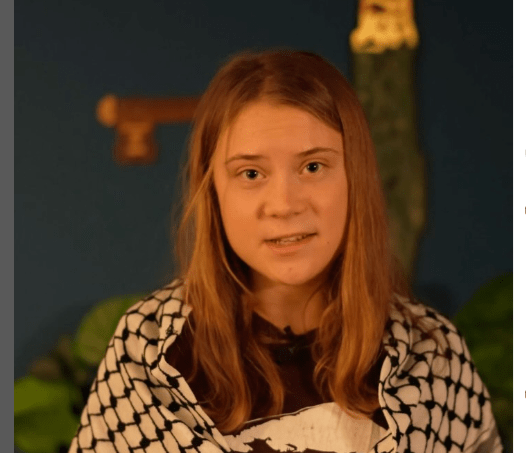Unavoidably, Greta Thunberg’s ascent to prominence as a climate activist has attracted public attention outside of her advocacy. Strangely, a significant amount of that attention has been focused on her family’s alleged wealth—a story that has been repeatedly rehashed online echo chambers, making the untrue assertion that she would inherit millions from her parents. Upon closer examination, these claims—which remarkably resemble spam produced by artificial intelligence—have turned out to be incredibly false.

In 2009, her mother, Malena Ernman, competed for Sweden in Eurovision. Despite not winning, she made a good impression by placing twenty-first. Even though she is still regarded as a recognized figure in Swedish opera, her pay is commensurate with an experienced performer in a specialized but culturally rich field. Before Greta’s debut on the international scene, her father, Svante Thunberg, had a few small acting jobs. Even though he now frequently travels abroad with his daughter, critics have greatly exaggerated his wealth and notoriety.
Greta Thunberg and Her Family Background
| Name | Detail |
|---|---|
| Full Name | Greta Tintin Eleonora Ernman Thunberg |
| Birth Date | 3 January 2003 (Age 22) |
| Birthplace | Stockholm, Sweden |
| Known For | Youth climate activism, Fridays for Future, anti-war protests |
| Mother | Malena Ernman – Opera singer, 2009 Eurovision contestant |
| Father | Svante Thunberg – Actor, environmental advocate |
| Grandfather | Olof Thunberg – Actor and director |
| Net Worth Rumors | Falsely claimed $10 million inheritance, $18M net worth |
| Real Economic Background | Upper-middle-class by Swedish standards, not multi-millionaires |
| Verified Source |
Clickbait headlines claiming that Greta is worth $18 million and that her family owns several estates in Stockholm, including a lavish yacht, have been all over social media in recent months. When a now-discredited blog claimed she had gotten presents like a Tesla, a BMW X5, and even a $250,000 speaker’s fee each event, the rumors intensified even more. The story, which was especially imaginative in its exaggeration, fell apart due to its inherent inconsistencies.
Using Sweden’s publicly available income tax data, which is generally regarded as being very trustworthy, makes it abundantly evident that the Thunbergs are by no means affluent elites. They represent, at most, what may be called well-off professionals who live simply in a nice part of Stockholm. After turning 18, Greta herself acquired a modest two-bedroom flat, noticeably eschewing the ostentatious accoutrements that such tales suggest.
Greta has done a remarkable job of breaking through the clutter with her rebuttals. She affirmed with remarkable openness in a June 2019 tweet that she has never received payment for her speaking engagements. She restated that she donates the proceeds from the sale of her books to charitable organizations. This position, which has been maintained throughout interviews and public declarations, has made it especially challenging for critics to back up their charges without coming across as blatantly false.
Her family did not benefit from even her most well-known endeavors, including the 2020 documentary I Am Greta. The film, which was shot with remarkable sensitivity by Nathan Grossman, followed her famous Atlantic voyage and early objections. Despite receiving positive reviews at festivals, it didn’t make much money. The effort reinforced the Thunberg household’s constant ethics by raising awareness rather than making money.
Greta’s public persona remained rooted in protest throughout the pandemic, as influencers rushed for sponsored material and paid attention. She maintained her message with remarkable consistency by strategically aligning herself with grassroots movements instead than businesses. This strategy is especially novel in the current media environment, when influencer deals and sponsorship possibilities frequently weaken advocacy.
Her ancestry, especially her grandpa Olof Thunberg’s acting career, has been used by critics as a springboard to argue that her whole demeanor is produced. However, rather than highlighting any shortcomings in her personality, these attacks speak more to the cynicism of the digital age. The Thunbergs have taken considerable care to prevent Greta from becoming a commercial product rather than profiting on their ties. In a culture that is fascinated with celebrity, their restraint is all the more remarkable.
Any hint of opportunism is conspicuously missing from their narrative. Malena and Svante co-wrote a book on their family’s climate awakening, but the money raised went toward raising awareness rather than indulgences. No ostentatious sponsorships, no lifestyle rebranding. Just a silent pledge to be credible.
The environmental movement has been widely assailed during the last ten years, not only for its demands but also for those who carry them out. Public leaders, especially young women, are frequently the target of intrusive rumors that cast doubt on their financial motivations in an effort to undermine their message. These strategies have been especially aggressive and almost obsessive in the context of Greta’s work.
However, the more people conjecture, the more the Thunbergs’ decisions appear to be incredibly dependable. Values, not appraisals, are reflected in their behavior. Even when there were offers that could have instantly boosted Greta’s bank account, her priorities have never shifted to money. Most young influencers would have thought of them as once-in-a-lifetime opportunities, but she has turned them down.
Greta has contributed to the redefining of what contemporary activism may look like by fusing strict openness with overt protest. Her strategy offers a radically different model in light of corporate activism’s recent transformation into a marketing tactic. Her sincerity not only advances her cause but also calls into question the foundation of influencer capitalism.
The journey taken by the Thunbergs is especially helpful for young activists in their early stages. It emphasizes that in the face of international attention, it is possible—though certainly challenging—to maintain one’s independence, persuasiveness, and essential values. Their narrative encourages young people to speak up without worrying that their intentions would be unjustly misrepresented as luxury fantasy.
If anything, the enduring nature of these tales speaks to a broader issue with society’s discomfiture with genuineness. The default assumption turns into distrust when someone declines riches. But the Thunbergs continue—silently, ethically, and with a morality that is very uncommon in today’s public life.
Millions of students have joined the Fridays for Future movement, which has expanded across continents since Greta’s protest began. There was no payment for that groundswell. Elites did not choreograph it. Someone who didn’t want anything in return started it.
